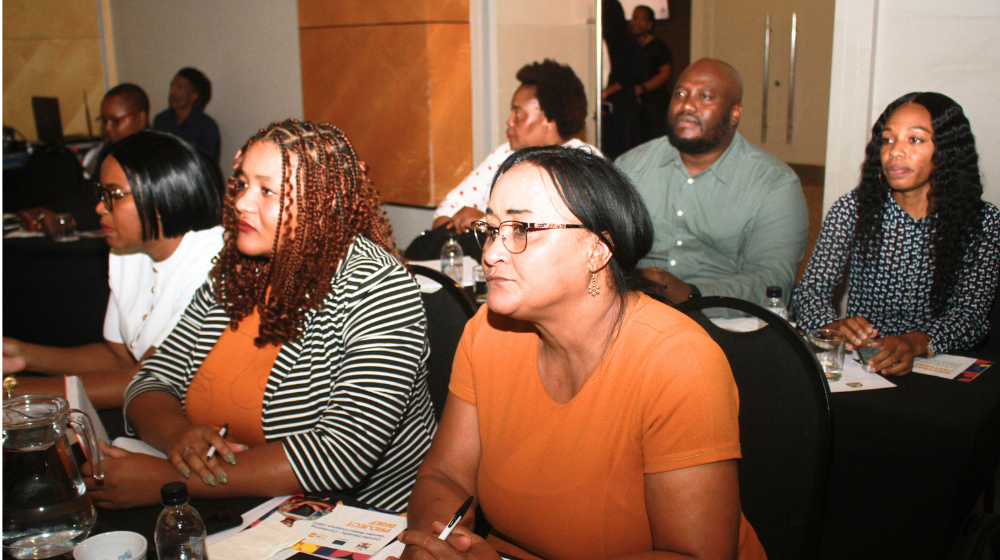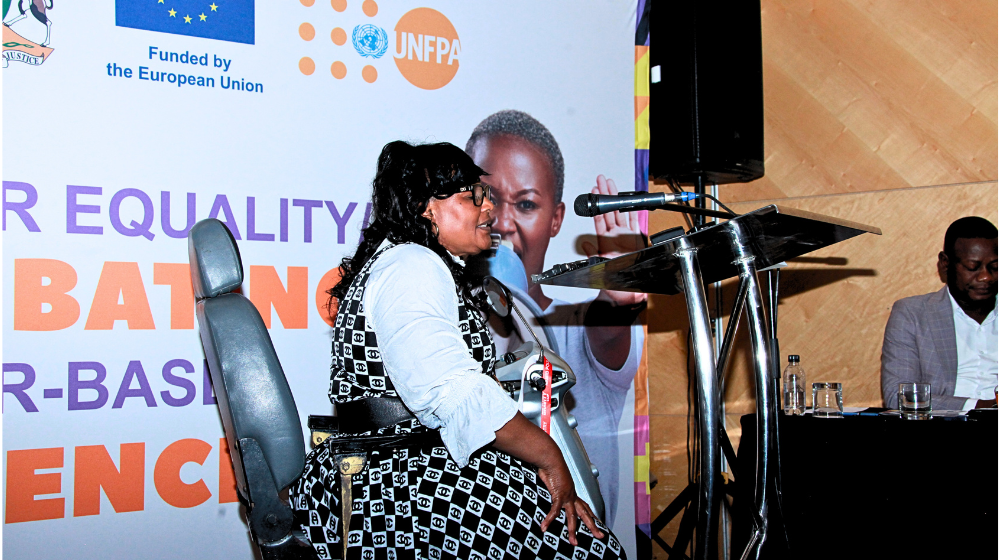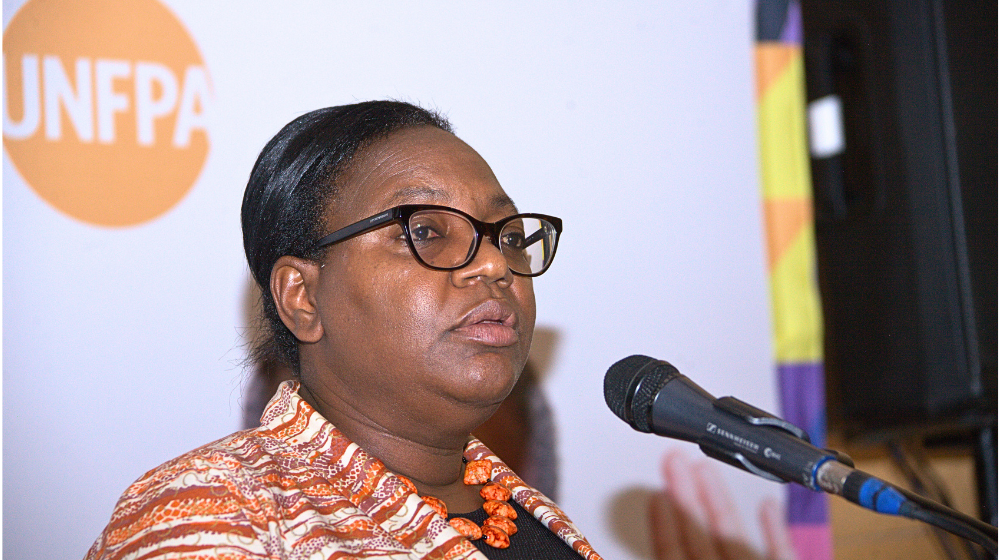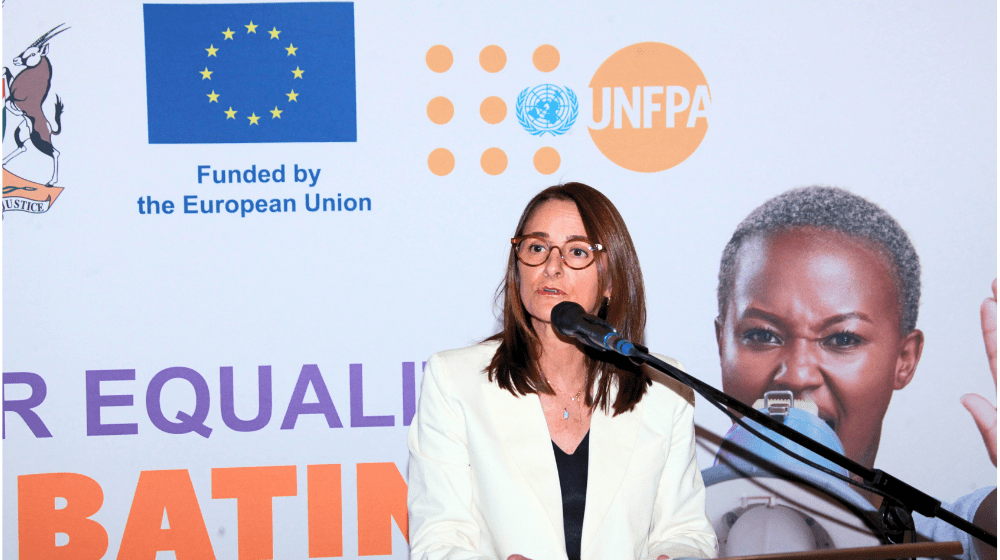
WINDHOEK, Namibia – Today the Ministry of Gender Equality, Poverty Eradication and Social Welfare (MGEPESW) and the United Nations Population Fund (UNFPA) in partnership with the European Union (EU), spearheaded a groundbreaking inception meeting for the Gender Equality/Combating Gender-Based Violence Project — a critical step towards comprehensively eradicating GBV and promoting gender equality in Namibia.
The inception meeting introduced participants to the Gender Equality/Combating Gender Based Violence Project, facilitating the review and definition of areas of synergies and collaboration. Furthermore, it encouraged the exchange of information and best practices in GBV prevention and response, with an emphasis on the implementation of cross-sectoral programs and policies related to GBV prevention and response.

During the inception meeting, Minister of Gender Equality, Poverty Eradication, and Social Welfare (MGEPESW), Hon. Doreen Sioka emphasised the urgent need to invest comprehensively in addressing the pervasive issue of GBV, which includes prevention, response, and mitigation strategies.
GBV is not only a violation of human rights but also a barrier to achieving sustainable development and gender equality.
“GBV is not only a violation of human rights but also a barrier to achieving sustainable development and gender equality. Through investing in prevention, response, and mitigation, we uphold survivors' rights and foster inclusive societies, requiring collective action and sustained commitment”, said Honourable Sioka in a statement read on her behalf by her Deputy: Disability Affairs, Alexia Manombe-Ncube.
Key stakeholders from national and regional levels, including representatives from government agencies, civil society organisations, academia, media, and the private sector, all attended the inception meeting which also saw the Project Steering Committee receive its mandate from the Hon. Minister to begin overseeing the implementation of the Gender Equality/Combating Gender Based Violence Project 2024 - 2027.
The inception meeting was the first of a series of activities under the Gender Equality/Combating Gender Based Violence Project, which is funded by a generous EUR 1.4 million contribution from the European Union and supported by UNFPA's commitment of EUR 140,000 over 48 months.
Focusing on preventing GBV and safeguarding the rights of women and girls, the Gender Equality/Combating Gender Based Violence (GBV) project seeks to enhance coordination and service provision mechanisms. Additionally, it aims to engage communities in preventing and responding to GBV while improving data systems to inform evidence-based policies and programming.
EU Ambassador Her Excellency Ana Beatriz Martins, reiterated her organisation’s commitment to combating GBV and promoting gender equality in Namibia, noting that gender equality and women’s empowerment are core values of the EU and a key priority in its internal and external policy.
“The EU’s new Action Plan on Gender Equality 2020–2025, which is the main cornerstone of our gender mainstreaming efforts has identified gender equality, women's empowerment, peace and security as cross-cutting issues to be included in all EU policies, strategies and projects”, she explained during her remarks at the inception meeting.
Here in Namibia, EU policy includes, for example promoting the rights of women and children as well as promoting economic, social and cultural rights.
“Here in Namibia, EU policy includes, for example promoting the rights of women and children as well as promoting economic, social and cultural rights”, she added.
The inception meeting also identified ways to improve sustainability across government, society, and systems. This includes enhancing regional coordination and accountability mechanisms and strengthening institutional systems to ensure effective and coordinated GBV work continues beyond the project's duration.
The project, which will run from 2024 to 2027, underscores a collective commitment to support the Namibian Government in combating gender-based violence at both national and subnational levels with a focus on strategic interventions in critical regions, such as Zambezi, Ohangwena, Khomas, Kunene, and Omaheke as well as addressing identified gaps in the National Gender Policy and the National GBV Plan of Action.
According to the 2013 Namibia Demographic and Health Survey - the last comprehensive data collection on GBV at a national level - an estimated 33% of ever-married women aged 15-49 years reported having experienced physical, sexual and/or emotional violence from their partners, while about 32% of adolescent girls aged 15-19 years and 35% of young women aged 20-24 years reported having experienced physical violence from a partner.

Gender-based violence remains a harsh reality in our communities, disproportionately affecting the lives of women and girls.
“Gender-based violence remains a harsh reality in our communities, disproportionately affecting the lives of women and girls. The statistics are alarming and these numbers represent not just data but the lived experiences of our fellow citizens, highlighting the urgent need for action and intervention," stressed UNFPA Namibia Representative, Ms. Erika Goldson.
The UNFPA representative expressed gratitude to both the European Union and the Government of Namibia, noting that this initiative would not be possible without the Ministry of Gender Equality, Poverty Eradication and Social Welfare’s unwavering support and collaboration.
“As we commence the roll out of this programme today, we acknowledge that success will require close collaboration with the Ministry, line ministries, as well as civil society organisations. Your expertise and commitment are indispensable as we work together to implement strategic interventions aimed at addressing gender-based violence in critical regions across Namibia”, said Ms Goldson.
Namibia has implemented several progressive laws to address gender inequality and gender-based violence, including the Married Persons Equality Act, Combating of Domestic Violence Act, Children's Status Act, Combating of Rape Act, and Maintenance Act. However, despite this, the country has encountered challenges in their implementation.
By the conclusion of the Gender Equality/Combating Gender Based Violence Project, the Ministry of Gender Equality, Poverty Eradication, and Social Welfare; the European Union and UNFPA seek to strengthen national and subnational institutions systems for GBV prevention and response; ensure that target communities empowered to address gender and socio-cultural norms that perpetuate GBV as well as increase access to and utilise GBV prevention and response services for GBV survivors and persons at risk.
“As we embark on this journey with the support of the European Union, I issue a call to action. This EU-funded program signifies a new chapter in our quest for gender equality and marks a critical moment where our actions must align with our aspirations”, urged Hon. Doreen Sioka.
“Leadership and collective efforts are vital in combating GBV, let's unite to comprehensively address GBV prevalence in our country”, she concluded.



